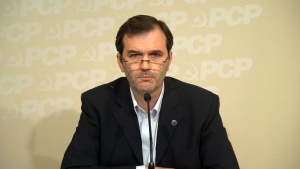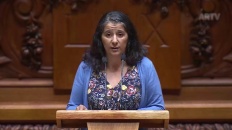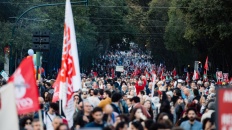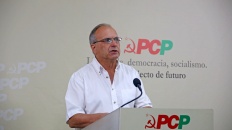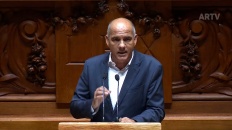The first word of the PCP is for the farmers, fishermen and workers.
For all those who persistently continue to sow seeds on the soil, plant their crops, fertilize, till, prune, dig, feed and care for their animals, for all agricultural workers, including the migrants who are so often under subhuman conditions and that the big landowners and middlemen leave to their fate on the first occasion, and those who continue to go to the sea, to ensure the supply of our markets and the food of the Portuguese people.
The Covid-19 epidemic outbreak required immediate responses with a view to prevention to stop its spread and ensure treatment, to save as many lives as possible.
But it also brought to the fore problems that, in particular, the PCP has always denounced, sometimes with the incomprehension of many, be it the need to strengthen the National Health Service, or, what concerns us here, the defence of the food sovereignty of our country.
The PCP has dealt with this matter, warning of the country's high agri-food deficits, including through the voice of its General Secretary, Jerónimo de Sousa.
In the current circumstances that the country and the world face, the PCP considers it essential to take measures to ensure food supply to the Portuguese population and has been following this reality, namely by forwarding questions in the Assembly of the Republic and even with legislative proposals.
It is important to underline the framework of difficulties in the food sector seen in this crisis.
A framework where the consequences of decades of integration in the European Union prevail, the imposition of the Common Agricultural Policy and the Common Fisheries Policy and national policies to serve large agribusiness, concentration of production and distribution, with the destruction of our productive apparatus, with the elimination of more than 400 thousand farms, particularly small and medium-sized ones, and with the scrapping of thousands of vessels.
A framework of the aging of the farming population with the farmers being, on average, over 66 years old.
A framework of very strong external dependence to ensure our food, with a negative external food balance close to four thousand million euros, a situation that is particularly serious in grains, first of all in wheat, with a dependence of more than 90% (and it is known that the area of winter grains has decreased again and is even the smallest in the last 100 years, according to the INE- Statistics Bureau) and in corn, as confirmed a few weeks ago by Anpromis in its Congress, where national production only ensures 30 % of national needs; in fishing, with a dependency in the order of a thousand million euros per year or in meat, namely in beef, which also weighs almost a thousand million euros in the balance.
But we could be talking about potatoes or milk products and we would have a bigger picture.
The crisis that we are going through belies the theories, which justified the choices of successive governments, namely the PSD/CDS, and which Capoulas Santos [PS government agriculture minister] also shared, that the solution was the balance of the trade balance in value. Now we can have plenty of olive oil to sell and try to balance the figures of the food balance, but not be able to feed our people.
Or the theory recently advocated by the Minister of the Environment, that it would be cheaper to buy cattle abroad than to produce them in Portugal.
The PCP also underlines the weaknesses of the Ministry of Agriculture caused by decades of right-wing policy that led to increased difficulties in technical monitoring and in helping small farmers.
The epidemic outbreak poses new challenges and demands to agriculture and national fisheries.
The first signs are worrying.
Sectors of the greatest importance are witnessing very significant declines in demand, among which we could highlight fish, indigenous breeds, sheep and goats, cheeses, piglets, but also a sector that, although not essential, represents thousands of jobs and more than 7% of national agricultural production, that of plants and flowers.
The closing of food markets, canteens and restaurants and the failure to hold some fairs and events, for example, to promote Queijo da Serra cheese, led to problems of inability to market, which need to be addressed.
On the other hand, despite the effort made by farming organisations to keep their supply structures in operation, it is necessary to ensure that there are no interruptions in the supply of seeds, fertilizers, plant protection products and other factors of production, especially to small and medium-sized producers.
Food is an essential good for humanity. It must be among the priorities of government action. It demands immediate measures of accompaniment, of political initiative, of intervention to ensure continuity in the supply to the populations.
In this context, the PCP, expressing its disappointment at the fact that it was not included in the Crisis Office, associated with the monitoring of the State of Emergency, either through the Ministry of Agriculture or the Ministry of the Seas, considers it essential to ensure that these measures are aimed in particular at small and medium-sized farming and family farming, and at small fishermen and ship-owners, namely:
- the picking up of food production (agricultural and fisheries), at fair prices to production, involving the existing associative structures, so as not to waste what is in the fields or livestock ready to supply the populations, to ensure income for producers and fishermen and capacity to continue the work, namely to start the next campaign that is at the doorstep.
Failure to assure it is the announced ruin of thousands of farms, it is leaving the country at the mercy of whoever wants to sell us, at any price, if each country does not start to retain its own food reserves.
- keep local food markets in operation, and reopen some that have since been closed, in fixed or temporary structures, ensuring conditions of hygiene, health and food safety and for the people.
- the consideration of cash support suitable to the agricultural reality, namely with very long-term loans, and adjusted grace periods, with the necessary adaptations in the fiscal and contributory regime.
- ensuring right to mobility for farmers, to their farms, to buy what they need, to market production, with support from the authorities for that purpose.
- the anticipation of all EU aid, easing rules and procedures, ensuring, for example, the suspension of the “greening” criteria and maximizing the small farming regime.
- the guarantee of personal protective equipment necessary for agricultural and fishing activities. It should be noted the particular exposure of certain sectors, such as fishermen, who are forced to work in confined spaces.
- the guarantee of the necessary emergency support for the structures of the Association Movement, now that they are unable to develop several publicly funded projects, to continue the work in which they replace the Ministry of Agriculture.
For the PCP, the essential issue is to ensure immediate income for farmers and fishermen and ship-owners to ensure that they do all the spring sowing and continue to go to the sea and materialise the full productive potential of the country. The defence of our people demands intensifying the struggle for food sovereignty.
